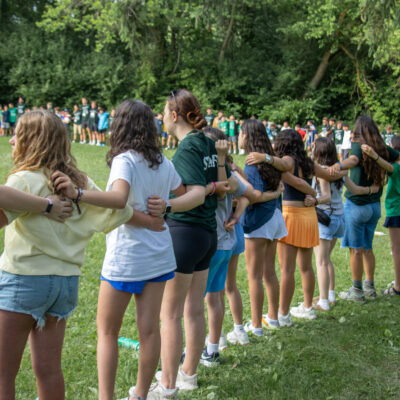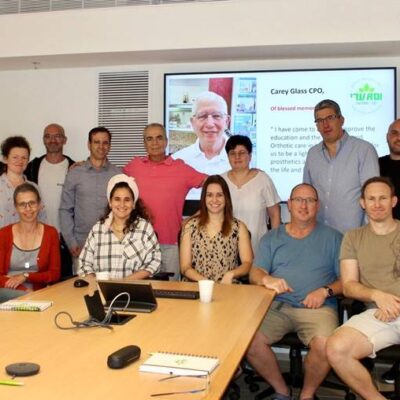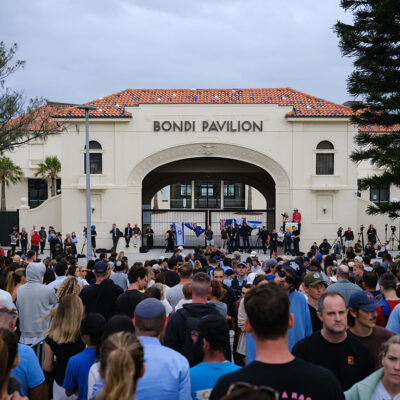Your Daily Phil: New grants from Covenant Foundation + New York City’s Museum of Jewish Heritage teams with Yad Vashem
Good Thursday morning!
New York City’s Museum of Jewish Heritage – A Living Memorial to the Holocaust and its genealogy affiliate JewishGen launched a new partnership with Yad Vashem that will enable the public to gain more access to genealogical records.
Yad Vashem has collected information on roughly 2.7 million individuals who died in the Holocaust. Those records, in addition to the memorial’s database of names of Holocaust victims — which includes more than 4.8 million names — will now be easily accessible through JewishGen.
While making the records available to the public is the primary goal of the partnership, those involved are also hopeful that the easier access to records will ultimately help researchers find information on the many Holocaust victims about whom no information is currently known. “More than one million Holocaust victims have yet to be memorialized at Yad Vashem,” said Alexander Avram, director of Yad Vashem’s Hall of Names. “By widening the exposure of our endeavor through JewishGen, the genealogical community will be able to play an important role in helping us add a large number of Pages of Testimony in the years to come.”
Seed money
Covenant announces grants in Jewish education

Getty Images
The Covenant Foundation announced on Wednesday $1.7 million in new grants to 19 organizations for projects supporting some of the newest and most forward-thinking ideas in Jewish education. Thirteen programs received Signature grants, with funding of up to $150,000 over three years, and another six received Ignition grants, of up to $20,000 for one year to support new and untested approaches, reports eJewishPhilanthropy’s Esther Kustanowitz.
Next gen: jGirls Magazine, an online community and magazine written by and for Jewish girls ages 13-19, received a Signature grant for its new experiential leadership program, Learn Together, which will support individuals ages 16-22 in “examining power, responsibility and the issues that most deeply impact their lives through Jewish and gender lenses,” jGirls Founder and Executive Director Elizabeth Mandel told eJP. “It will give them the tools and opportunity to share their areas of concern and expertise with broad audiences and center teen voices in the discussions and decisions that impact their lives.” The program — which will seek participants representing the diversity of Jewish identification/affiliation, sexual orientation, geography, gender expression and identity, race, ethnicity and abilities — will also strengthen networks that will provide participants with professional and peer support on their leadership journeys, Mandel said.
Getting creative: Another Signature grant recipient is theatre dybbuk, a Los Angeles-based theater company that creates provocative performances and innovative educational encounters that explore Jewish thought to illuminate universal human experience. The Dybbukast Live program will bring residencies – including live performances and training workshops for educators and community leaders – to six cities, and provide additional opportunities for others to engage with the content. “We are excited that The Covenant Foundation’s support of The Dybbukast Live allows us to collaborate with a broad array of partners in cities throughout North America, enabling us to offer theatrical and artistic approaches to exploring the ways in which Jewish history can illuminate the complexities present in our world,” Aaron Henne, theatre dybbuk’s artistic director, told eJP.
Addressing pronounced issues: “The 2022 slate of Covenant grants reflects the dynamic challenges of these uncertain times,” said Joni Blinderman, who took over as Covenant’s executive director on Jan. 3. “These grants will support an array of projects that seek to ameliorate pressing social-emotional and academic concerns in the Jewish community, as well as the longer-term systemic problems related to diversity, equity and inclusion,” Blinderman added. “In many ways, these issues became more pronounced and were exacerbated by the public health crisis of the last two years, but we are incredibly heartened by the unabashedly optimistic approach each of these new grantees brings to their work.”
Grantee list: In addition to jGirls Magazine and theatre dybbuk, 2021 Signature grants went to: Adas Israel Congregation in Washington, D.C.; American Jewish University in Los Angeles; The Center for Small Town Jewish Life at Colby College in Waterville, Maine; Hannah Senesh Community Day School in Brooklyn, N.Y.; Jewish Communities of Vermont in Burlington, Vt.; Jewish Learning Venture in Jenkintown, Pa.; M²: The Institute for Experiential Jewish Education in Brooklyn, N.Y.; OneTable in New York; Sacred Spaces in Pittsburgh; South Philadelphia Shtiebel in Philadelphia; and Theater J at the Edlavitch DCJCC in Washington, D.C.
RETHINK, REBUILD, RELEARN
Why Jews are like aspen trees

Pixabay
“One of the quotes that is repeated the most around the holiday of Tu B’Shevat (the ‘New Year of the Trees’) is, ‘Because Man is like a tree in the forest.’ Rabbis in every generation have tried to explain that meaning-rich comparison, and many see that quote at the root (so to speak) of Judaism’s approach to stewardship of the Earth… But can a tree be compared not to an individual person, but an entire people?” asks Andrés Spokoiny, president and CEO of Jewish Funders Network, in an opinion piece for eJewishPhilanthropy.
The aspen tree: “One particular tree can. The aspen, from which that beautiful Colorado town takes its name, is a remarkable plant. Beneath its deceptive simplicity, that tree is a wonder of evolution. Aspens are connected by their roots to other aspens, making aspen forests not a collection of individual trees, but one single organism.”
Interconnectedness: “The interconnectedness of the aspen trees makes them incredibly resilient. Nutrients and water circulate freely among the trees, and the stronger help the weaker to the entire forest’s benefit. That’s how the Pando Forest, for example, is believed to have survived the Ice Age. The aspen has also performed a great feat of adaptation that allows it to thrive in the harsh winters of the Rockies.”
Our secret sauce: “We too are connected at the roots, which is, in great measure, the secret to our resilience. We are all linked in an inextricable network of mutuality and that has allowed us to endure and outlive the challenges that history has thrown at us. That interconnectedness is ideological, existential even, but it’s also very practical: Every Jewish community understood that we are only as strong as our weakest link, and that help needs to flow from the privileged to the less fortunate.”
local talent
Israeli organizations: Do the Zionist thing and use Israeli professionals

The Jewish Agency via eJP
“It has been reported that the New York-based Big Duck PR agency declined to work with the North American and Jerusalem-based Shalom Hartman Institute because of its presence in Israel and its objection to working with an institution that opposes the Boycott, Sanctions and Divestment (BDS) movement… I speak for myself and many colleagues in Israel who are dismayed that some Israeli organizations, some quite large, feel they need to work with American PR agencies to garner media coverage they need in order to enhance their organization’s image abroad, raise funds and participate in conversations concerning Israel, the Diaspora and the region,” writes Laura Kam, a Jerusalem-based PR professional, in an opinion piece for eJewishPhilanthropy.
On the ground: “PR professionals in Israel, especially the ones who made aliyah (like me), are uniquely qualified to get out the right messages about Israeli organizations. They, more than anyone, understand the issues from a local and international perspective as they live it on a daily basis, and they have a keen understanding of the audience they need to reach.”
It’s our job: “We know, because that’s our job, that stories about Israeli organizations, their leaders, their issues and the content which they wish to share are almost always going to come out of Israel. We know the local and international journalists and editors here, and we also know who is covering Israel/Diaspora/Mideast issues abroad.”
Worthy Reads
Social Support: Social entrepreneurs can greatly benefit from entrepreneur support organizations (ESOs), companies that mentor, train and sometimes fund entrepreneurs, UpStart CEO Aaron Katler writes in Forbes. “Ultimately, ESOs care about people – and the engine of innovation. They understand why it’s important to invest in people and their ideas. They understand it’s so important to create a supportive environment, encourage risk-taking and provide access to capital – and do it with an urgency to create impact but with the patience for growth.” [Forbes]
Union Label: Citing job insecurity, wage inequities and working conditions, and demanding more transparent employment policies, the workers at The Jewish Museum in New York are pushing to unionize, writes Hakim Bishara in Hyperallergic, an arts news site. The workers seek to join Local 2110 UAW, which represents workers at the Guggenheim, Whitney, and Brooklyn museums as well as other New York/New England cultural institutions: “Our goal is to create a workplace built upon communication, respect, and integrity, where staff are involved in setting the terms of employment and are allowed to sustainably grow their careers,” the workers wrote in a union mission statement. “In keeping with our love of the Jewish Museum’s exhibitions, collection, and rich history, the staff is eager to realize a fairer, more inclusive, and more diverse workplace.” [Hyperallergic]
Leadership Satisfaction: While nonprofits have a lot of pressing issues and challenges to consider amid the economic challenges of the pandemic, the job satisfaction of nonprofit leaders matters, too, writes Greg Berman in NYNMedia. “Many nonprofits, particularly in the arts, are struggling just to keep their doors open in the face of declining revenues. Nevertheless, the job satisfaction of nonprofit leaders matters. The no. 1 complaint I hear when I talk to nonprofit executives is that they are spending too much time on the care and feeding of their own staff – dealing with human resources, training, and internal communication issues – and not enough time trying to achieve the actual goals of their respective organizations.” [NYNMedia]
Community Comms
Be featured: Email us to inform the eJP readership of your upcoming event, job opening, or other communication.
Word on the Street
Marvin I. Schotland, longtime president and chief executive officer of the Jewish Community Foundation of Los Angeles, will step down at the end of 2022…
Rabbi Jeffrey Schein has been named the executive co-director of the Mordecai M. Kaplan Center for Jewish Peoplehood…
Julie Gibbs is leaving her position as vice president of development at the Jewish Federation of St. Louis to become vice president and chief philanthropy officer for the St. Louis Symphony Orchestra…
Prince Charles commissioned portraits of seven Holocaust survivors, by seven artists, that will go on display at Buckingham Palace.
Zamir Choral Foundation received a grant from the New York State Council on the Arts to support the recovery of the nonprofit arts and culture sector…
The Chan Zuckerberg Biohub announced $86 million in new funding for visionary early-stage research…
The William, Jeff and Jennifer Gross Family Foundation awarded grants totaling $17.1 million…
Howard Solomon, former chief executive of New York-based pharmaceutical company Forest Laboratories, died at 94…
Pic of the Day

Soeren Stache/picture alliance via Getty Images
Norwegian artist Bente Kahan, whose foundation bears her name, in front of the exhibition poster at this week’s opening of the “Unfinished Lives” show in the parliament building in Potsdam, Germany. The traveling exhibition represents 18 artists who were imprisoned, mistreated and murdered during World War II because of their Jewish ancestry.
Birthdays

Gregg DeGuire/FilmMagic
Actress and producer, winner of 11 Emmy Awards, Julia Louis-Dreyfus…
Family therapist in Bakersfield, Calif., Kathleen Arnold-Chambers… Las Vegas resident, Cathy Nierenberg… Retired teacher, Lucia Meyerson… NYC pediatrician at Carnegie Hill Pediatrics, Dr. Barry B. Stein… Lifelong resident of Greenwich Village and citizen advocate on the board of the Hudson River Park, Susanna Beth Aaron… President of the Pritzker Traubert Foundation, Cindy S. Moelis… Kaileh Lynn Pistol… Founder of the Freelancers Union, she was a MacArthur Fellow in 1999, Sara Horowitz… Retired member of the Senate of Canada and chair of the UJA of Greater Toronto, Linda Frum… Partner in King & Spalding, former deputy attorney general of the U.S., Rod J. Rosenstein… Ashkenazi chief rabbi of Israel since 2013, Rabbi David Baruch Lau… Executive assistant in the DC office of JFNA, Bruce Maclver… Resident scholar at the American Enterprise Institute, Kenneth M. Pollack… CEO of Amazon, Andrew R. Jassy… Social media professional, Heidi Krizer Daroff… Statistician and writer who analyzes baseball and elections, he is the editor in chief of ABC News’s “FiveThirtyEight,” Nate Silver… Former VP of donor relations at The Jewish Federation of Greater Los Angeles, now an M.A. candidate at Pepperdine, Shira Berenson Feinstein… Master of science candidate at the University of Denver, Carly Freedman Schlafer… Rebecca Seider… Sandra Shapiro…
Email Editor@eJewishPhilanthropy.com to have your birthday included.


 Add EJP on Google
Add EJP on Google






